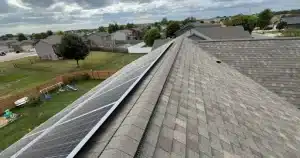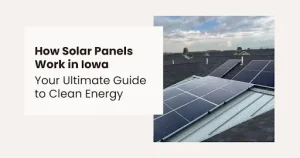Iowa, particularly Des Moines, is seeing a surge in homeowners embracing solar energy. The rising costs of traditional energy and the environmental impact of fossil fuels have many searching for sustainable alternatives. Solar panels present a practical, clean energy solution that not only reduces electricity bills but also contributes to a greener environment. Yet, the process of how solar panels convert sunlight into electricity can seem complex. This guide simplifies that process, showing you exactly how solar panels work and why they’re an excellent choice for your Des Moines home.
The Basics of Solar Power in Des Moines
How solar panels work might seem stressful at first, but when broken down, the process is quite straightforward. Solar panels absorb sunlight and transform it into usable electricity for your home, helping to reduce your reliance on the power grid. As more Des Moines residents turn to solar energy, understanding how solar panels work becomes essential to making an informed decision. With this knowledge, you can join the growing number of Iowans taking control of their energy needs and saving money in the process.
How Solar Panels Work: The Iowa Perspective

Solar panels operate through a series of steps that begin with sunlight and end with electricity flowing through your home. Here’s a step-by-step explanation:
- Sunlight Absorption: Solar panels, typically installed on your roof, are composed of photovoltaic (PV) cells. When sunlight hits these cells, it triggers a reaction that causes electrons to move, creating direct current (DC) electricity. This initial step is fundamental to how solar panels work step by step.
- Conversion to Usable Energy: The DC electricity generated by the solar panels cannot be used directly in your home. It first needs to be converted into alternating current (AC) electricity through an inverter. This AC electricity is what powers your appliances, lights, and other household devices. This conversion process is crucial to how solar panels work to generate electricity.
- Powering Your Home: Once converted, the AC electricity flows into your home’s electrical panel, where it is distributed to various circuits and devices. This is how solar panels work on a house—by seamlessly integrating with your existing electrical system.
- Managing Excess Energy: On particularly sunny days, your solar panels might produce more electricity than your home needs. This excess energy can be sent back to the grid, allowing you to earn credits through net metering, a great benefit for homeowners in Des Moines.
How Solar Panels Perform Throughout the Year
Solar panels are designed to work efficiently throughout the year, even in Iowa’s diverse climate:
- How Solar Panels Work in Winter: Although shorter days and snow can reduce efficiency, solar panels still function effectively during Iowa’s winter months. They continue to absorb sunlight, albeit at a reduced rate, ensuring your home remains powered.
- How Solar Panels Work at Night: Solar panels don’t generate electricity at night. However, during the day, they can produce more than enough energy to meet your home’s needs, storing excess power for use during the evening or sending it back to the grid.
- How Solar Panels Work for Kids: To put it simply, solar panels work like plants using sunlight to grow. The panels capture sunlight and convert it into energy that powers your home, much like how plants use sunlight to create food.
The Science Behind Solar Panels
The operation of solar panels is rooted in the principles of the photovoltaic effect. When sunlight hits the PV cells, it excites the electrons, causing them to move and generate electricity. This basic principle, how solar panels work physics, is what powers everything from small devices to entire homes.
How Solar Panels Pay for Themselves in Iowa
Many homeowners in Des Moines wonder, “At what point do solar panels pay for themselves?” The answer depends on factors like installation costs, available incentives, and your home’s energy consumption. In Iowa, where state incentives are favorable and sunlight is abundant, solar panels can often pay for themselves within 5 to 7 years, making them a wise investment.
Conclusion: Take the Next Step with Wegner Roofing & Solar
As you now know how solar panels work, it’s time to consider the bigger picture. Explore the (Top Benefits of Solar Energy for Homeowners in Iowa) to see why making the switch is a smart choice for your home and the environment. Solar energy is not just a trend; it’s a smart investment for Des Moines homeowners looking to reduce energy costs and gain energy independence. At Wegner Roofing & Solar, we’re here to help you transition to clean energy with ease.
Call us today to learn more about how solar panels can power your Iowa home. Together, let’s make your switch to solar energy seamless and beneficial!
FAQS
- How does a solar panel system work step by step?
Solar panels absorb sunlight, convert it to DC electricity, which is then turned into AC electricity by an inverter for your home’s use. - How do solar panels work in detail?
The detailed process involves capturing sunlight in photovoltaic cells, converting it to electricity, and integrating it with your home’s electrical system. - How to calculate or design a solar PV system a complete guide?
This requires assessing your energy needs, analyzing sunlight exposure on your roof, and selecting the right system size and components. - At what point do solar panels pay for themselves?
Depending on various factors, including Iowa’s incentives and your energy usage, solar panels can pay for themselves in 5 to 7 years.



